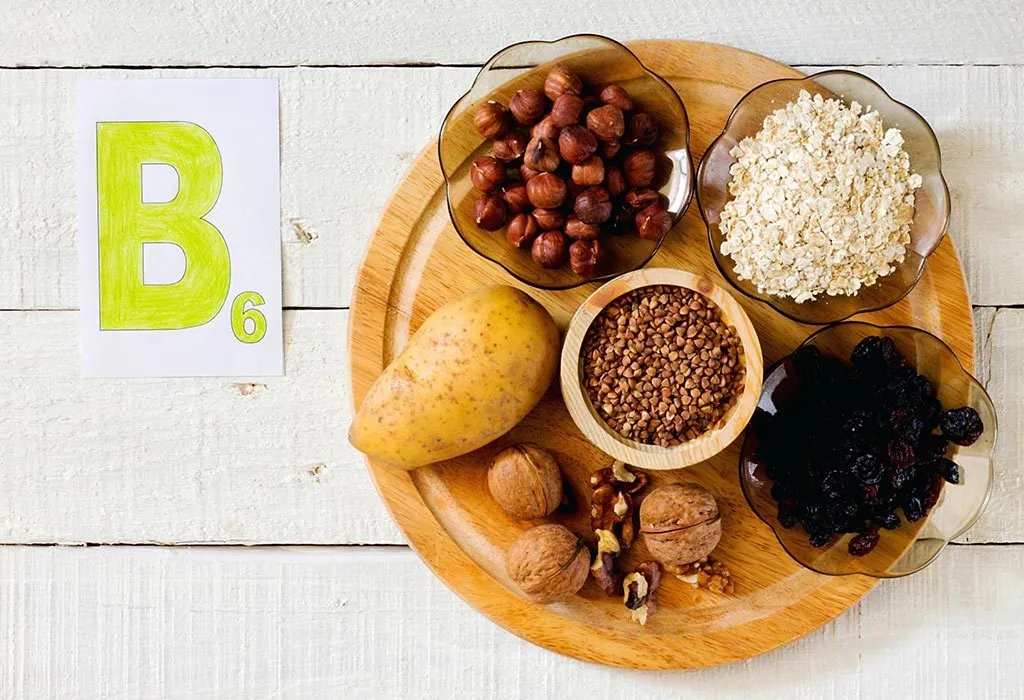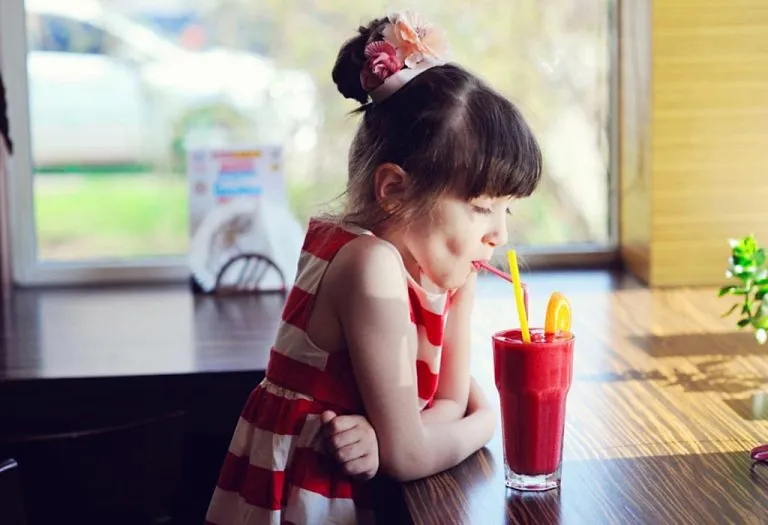Vitamin B for Kids – Benefits, Food Sources and More

- Different Types of Vitamin B and Their Benefits for Kids
- Vitamin B Recommendation for Children
- Food Sources of Vitamin B Complex
- Vitamin B Deficiency Symptoms in Children
- Are Vitamin Supplements Recommended to a Child?
- Kid-Friendly Vitamin B Snack Ideas
- FAQs
Vitamins and minerals are essential for your child’s overall health and development. Among the thirteen vitamins, the eight vitamins forming the B complex are particularly crucial. These water-soluble nutrients play a significant role in various bodily functions, including metabolism, energy production, and nervous system health. Ensuring an adequate intake of vitamin B for kids is essential during their formative years to support growth and overall well-being. From maintaining healthy skin and eyes to aiding in the production of red blood cells, the benefits of vitamin B for children are extensive. Read on to learn all about vitamin B, its benefits and how to incorporate it into the diet.
Different Types of Vitamin B and Their Benefits for Kids
The family of vitamin B complex for kids mainly include eight vitamins, namely:
1. Vitamin B1 (thiamine)
- It helps foster healthy nerves and muscles in kids (1).
- It is required by a kid’s body to break down carbohydrates into energy.
2. Vitamin B2 (riboflavin)
- It helps in boosting the production of red blood cells in your child’s body (2).
- It helps in digestion and energy production.
- It activates vitamin B6 and produces vitamin B3.
3. Vitamin B3 (niacinamide or niacin)
- It is involved in the process of converting fats and carbohydrates into energy (3).
- It is useful for the normal functioning of the nervous system and digestive system in kids.
- It also helps in promoting healthy skin in children.
4. Vitamin B5 (pantothenic acid)
- Children need it to metabolise fats and carbohydrates (4).
- It helps in the productions of red blood cells and adrenal hormones in kids.
5. Vitamin B6 (pyridoxine)
- It is essential to promote brain development in children (5).
- It is vital for kids as it helps the release of brain chemicals like serotonin, which regulates moods, and norepinephrine, which helps in coping with stress.
- It assists in maintaining the proper functioning of the nervous system and in keeping the immune system of children healthy.

6. Vitamin B7 (biotin)
- It is necessary for the metabolism of cholesterol, certain amino acids, and fatty acids in kids (6).
- It stimulates healthy skin, hair, and nails in children.
7. Vitamin B9 (folic acid)
- It plays a pivotal part in the formation of red blood cells in children (7).
- It is valuable for healthy cell growth and DNA production.
8. Vitamin B12 (cyanocobalamin)
- It may actively contribute to the creation of red blood cells in kids (8).
- It supports the healthy maintenance of the child’s nervous system and brain.
Vitamin B Recommendation for Children
Children of all ages may get their recommended essential daily requirements through a well-balanced and nutritious diet.
1. For Children Who Are 4 and Above
The dosage for a child who is 4 and above is:
- Pantothenic acid- 10 mg per day
- Thiamine- 1.5 mg per day
- Niacin- 20 mg per day
- Riboflavin- 1.7 mg per day
- Pyridoxine- 2 mg per day
- Folic acid- 400 mcg per day
- Biotin- 300 mcg per day
- Vitamin B12- 6 mcg per day
2. For Children Under 4 Years
Recommended daily allowances (RDA) for children who are younger than 4 is:
- Folic acid- 100/200 mcg per day
- Thiamine- 0.5/0.7 mg per day
- Niacin- 8/9 mg per day
- Riboflavin- 0.6/0.8 mg per day
- Pantothenic acid- 3/5 mg per day
- Biotin- 50/150 mcg per day
- Pyridoxine- 0.1/ 0.5 mg per day
- Vitamin B12- 2/3 mcg per day
Food Sources of Vitamin B Complex
Some of the important food sources of the vitamin B complex are:
- Fruits like watermelon, banana, and grapefruit
- Green leafy vegetables
- Dairy products
- Fish and seafood
- Eggs
- Meat
- Fortified cereals and bread
- Legumes like peas and beans
- Potatoes
- Nuts
- Whole grains
- Yeast
- Liver
- Poultry

Vitamin B Deficiency Symptoms in Children
The following are the symptoms of vitamin B deficiency in children:
- Insufficient levels can cause anxiety, irritability, and fatigue in kids.
- Kids can suffer from beriberi, and in some cases, even epilepsy.
- Deficiency of riboflavin can trigger cheilosis (mouth dryness), glossitis (tongue soreness), light sensitivity, skin rashes, and eye pain in children.
- It may induce diarrhoea, dermatitis, weakness, nausea, and abdominal pain in kids . Its deficiency can also cause depression, anxiety, and poor concentration in kids.
- It can lead to fatigue and gastrointestinal disorders.
- Vitamin B deficiency can lead to neonatal defects during pregnancy.
- Inadequate levels can cause lesions and abnormal skin rashes in kids.
- Deficiency of vitamin B in kids can impact their nervous system leading to symptoms like a tingling sensation, and numbness.
- Deficiency of vitamin B in kids can result in megaloblastic anaemia and developmental delays.
- It can lead to hindered growth, poor blood formation, and weak muscles.
Are Vitamin Supplements Recommended to a Child?
In case, the recommended dose of vitamin B is not met through a child’s daily diet, and it is desirable to take vitamin supplements, particularly in the case of vegan kids (9). However, it is important to refer to a doctor before consuming any vitamin supplements to know the proper dosage. It may be best to give vitamin supplements to kids in the form of drops rather than tablets, for better absorption.
Kid-Friendly Vitamin B Snack Ideas
Believe it or not, but there are a number of ways in which you can help your child get his daily dose of this vitamin. Here are some snack ideas that will help you include vital nutrient in your child’s diet.
- Make tasty rolls stuffed with green vegetables or meat, and add your kid’s favourite sauce for extra flavour.
- You can make a yummy chicken sandwich with tomatoes and lettuce.
- You can offer hard-boiled eggs as a snack to your kid.
- You can prepare a dip from pureed spinach and serve it with bite-size pieces of vegetables like carrots and broccoli.
FAQs
1. Can vitamin B supplements cause any adverse effects in children?
While vitamin B supplements are generally safe, excessive intake can lead to certain side effects such as nausea, vomiting, and diarrhea. It’s essential to adhere to recommended dosage guidelines and consult with a healthcare professional before giving supplements to children.
2. Can a deficiency in vitamin B affect a child’s cognitive development?
Yes, a deficiency in certain B vitamins, such as B12 and folate, can impact cognitive development in children, potentially leading to issues with memory, concentration, and learning abilities. Ensuring a balanced diet rich in vitamin B is crucial for supporting optimal brain function and development in children.
Nutrition for kids is essential, and parents often end up giving the wrong food, leading to an imbalanced diet. Using the food sources above, it should be easy for you to prevent the diseases caused by a lack of vitamin B.
References/Resources:
1. Thiamin; National Institutes of Health; https://ods.od.nih.gov/factsheets/Thiamin-HealthProfessional/
2. Riboflavin; National Institutes of Health; https://ods.od.nih.gov/factsheets/Riboflavin-HealthProfessional/
3. Top 6 Benefits of Niacinamide; Cleveland Clinic; https://health.clevelandclinic.org/niacinamide
4. Pantothenic Acid; National Institutes of Health; https://ods.od.nih.gov/factsheets/PantothenicAcid-HealthProfessional/
5. Abosamak. N, Gupta. V; Vitamin B6 (Pyridoxine); National Library of Medicine; https://www.ncbi.nlm.nih.gov/books/NBK557436/
6. Biotin; National Institutes of Health; https://ods.od.nih.gov/factsheets/Biotin-Consumer/
7. About folic acid; NHS; https://www.nhs.uk/medicines/folic-acid/about-folic-acid/
8. Vasavada. A, Patel, Sanghavi. D; Cyanocobalamin; National Library of Medicine; https://www.ncbi.nlm.nih.gov/books/NBK555964/
9. Does My Child Need A Supplement; Eatright.org; https://www.eatright.org/health/essential-nutrients/supplements/does-my-child-need-a-supplement
Also Read:
Protein for Kids
Vitamin A for Kids
Gummy Vitamins for Kids
Vitamin C Dosage for Children
Was This Article Helpful?
Parenting is a huge responsibility, for you as a caregiver, but also for us as a parenting content platform. We understand that and take our responsibility of creating credible content seriously. FirstCry Parenting articles are written and published only after extensive research using factually sound references to deliver quality content that is accurate, validated by experts, and completely reliable. To understand how we go about creating content that is credible, read our editorial policy here.















.svg)
















